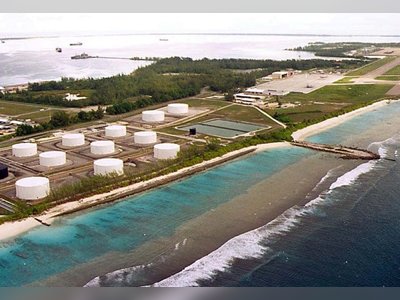
How the Queen’s constitutional role shifted over her reign
For 70 years, the Queen combined, with great success, two roles: head of state and head of the nation. These roles are both complementary and contradictory.
As head of the nation, the Queen sought to represent the country to itself, and indeed came closer than any monarch in history to reaching the soul of the British people. A head of the nation has to represent the whole nation, not just one part of it, and that requires political impartiality.
Yet as head of state, the exercise of that role’s discretionary power could easily be controversial, pitting one section of her people against another. It is for this reason that the Queen always spoke and acted on the advice of ministers. A fundamental condition for the success of her reign was that she made no attempt to intervene in politics, or even to express a political opinion.
The advice of ministers to the sovereign is binding, and the Queen normally had no option but to accept it. She could not, therefore, have a policy of her own independent from that of her ministers.
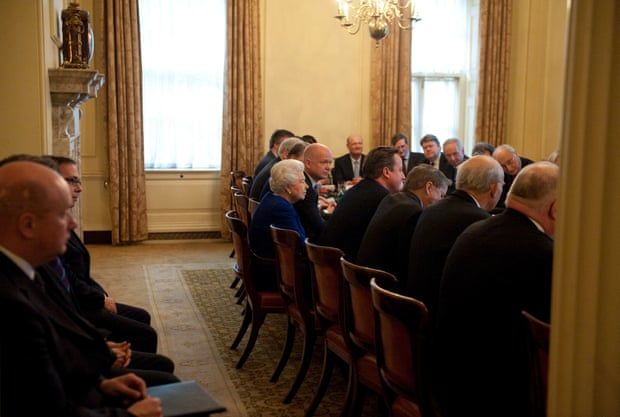 Queen Elizabeth II attends a cabinet meeting
as an observer in 2012 – the first time a British monarch had done so
since George III in 1781.
Queen Elizabeth II attends a cabinet meeting
as an observer in 2012 – the first time a British monarch had done so
since George III in 1781.
In 1952, when the Queen came to the throne, the principle of advice applied only during the existence of a government. It did not apply when a government was being formed and a prime minister had to be appointed, nor when a prime minister sought a dissolution of parliament. These were matters for the Queen’s personal prerogative. Admittedly, no prime minister in modern times has, so far as is known, been refused a dissolution; and the last time a sovereign exercised a genuinely personal choice of prime minister was in 1894. Nevertheless, there did seem to be a genuine discretion. But by the end of the Queen’s reign, that discretion had almost entirely gone.
Already, in 1952, there were signs of what was to come. The Labour party had by then decided that, were a Labour prime minister to resign or die in office, his replacement would be chosen by the parliamentary party, not by the Queen. There would be discretion, therefore, only in the case of a Conservative government.
In 1957, when Anthony Eden resigned, and the choice was between Harold Macmillan and RA Butler, and in 1963, when Macmillan resigned, and there were multiple candidates for the succession, problems arose. On both occasions, the Queen’s choice caused controversy, and particularly so in 1963 when, to some surprise, she appointed Lord Home rather than Butler, widely thought to be the favourite. The Queen’s decision was not a personal one, but based on a memorandum from the retiring prime minister, Macmillan, which seemed to make a conclusive case for Home. Critics argued that the memorandum seriously misrepresented Conservative opinion. Even if that were so, it was not for the Queen to conduct her own competing inquiries or she would have been accused of intervening in the internal affairs of the Conservative party.
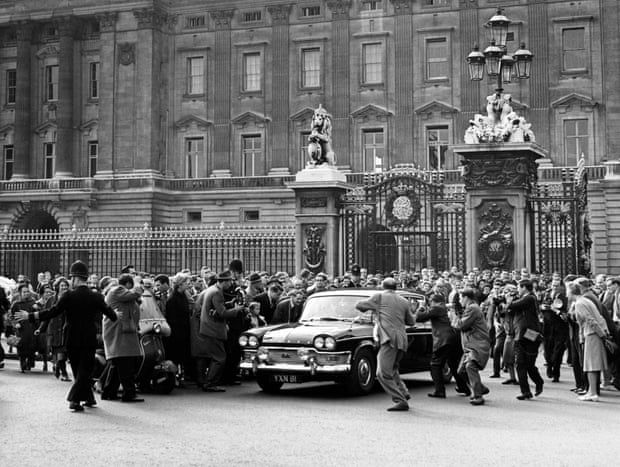 Alec Douglas-Home, Lord Home, leaves
Buckingham Palace in 1963, having met the Queen, who had asked him to
form a new government following the resignation of Harold Macmillan.
Alec Douglas-Home, Lord Home, leaves
Buckingham Palace in 1963, having met the Queen, who had asked him to
form a new government following the resignation of Harold Macmillan.
It was generally accepted that the Queen’s task was not herself to decide who would be the most suitable prime minister, but to endorse what the Conservative party decided. The Palace must have been pleased, therefore, when the Conservatives, in 1965, decided to emulate Labour by in future electing their leader when in government.
By the mid-1960s, therefore, the Queen seemed to have lost any discretion in the appointment of a prime minister, and 1963 was the last occasion on which the sovereign was required to appoint one on the basis of what Macmillan called “customary processes of consultation”.
In the 1970s, however, a new problem arose. The increase in electoral strength of the Liberals and nationalists made it possible that a hung parliament would result, as indeed it did after the general election of February 1974. This meant it might no longer be obvious who should be appointed prime minister after an inconclusive general election; moreover, the Queen might be justified in refusing a dissolution were it possible to form a government from the existing parliament without a general election.
The next hung parliament did not occur until 2010, 36 years later. Before the 2010 election, rules were published in a cabinet manual to ensure that the Queen’s political neutrality would not be compromised. These rules provided that the Queen would play no part in the formation of a new government. Her role was to endorse the decisions reached by the politicians. The non-involvement of the Queen in 2010 was symbolised by her remaining at Windsor, rather than returning to Buckingham Palace, during the five days of negotiations that followed the general election.
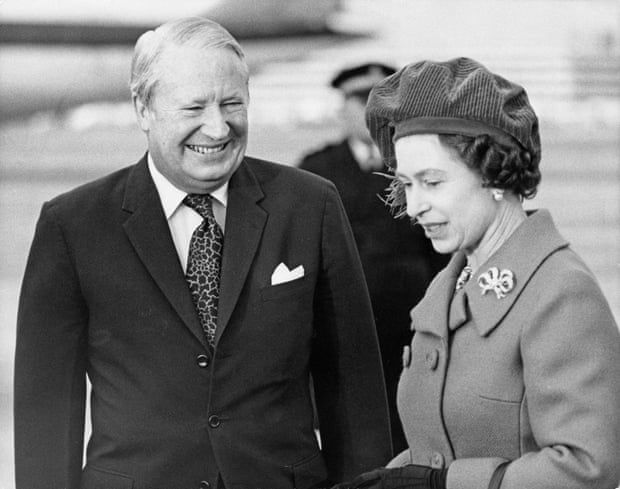 The Queen with the prime minister, Edward Heath, in 1974.
The Queen with the prime minister, Edward Heath, in 1974.
That was a striking contrast to the stance adopted by George V during the economic crisis of 1931. At that time, a conference had been held at Buckingham Palace, at which the King had virtually ordered the three party leaders to come together in a national government: a highly controversial use of the sovereign’s discretion.
In 1931 George V had played an active role as a facilitator, if not indeed as the instigator, of the national government. In 2010, by contrast, the Queen and her advisers were insistent she not be involved in the government formation process, and that she should be seen not to be involved.
As late as 1974, the Queen’s private secretary, Sir Martin Charteris, told Tony Benn, already a longstanding Labour MP, that the discretion to refuse a dissolution must be preserved “because I think there has to be some risk attached in order to provide excitement for the monarchy”.
In 2010 the Fixed-term Parliaments Act removed the Queen’s discretion in agreeing to or refusing a dissolution of parliament. It laid down specific conditions under which an early dissolution was possible – either a two-thirds vote by MPs, or the failure to find an alternative prime minister within 30 days of a vote of no confidence. If a prime minister sought a dissolution in any other circumstances, the Queen had to tell him or her that it was against the law. Even though the act has since been repealed, the Queen is left with only a very limited discretion to refuse a prime ministerial request for a dissolution.
In late 2019 as a minority Conservative government battled MPs over Brexit, a constitutional issue arose when the supreme court ruled unanimously that Boris Johnson’s advice to the Queen to prorogue parliament was unlawful. But prorogation, by contrast with dissolution, is a matter for prime ministerial advice and so the Queen had no alternative but to comply with her prime minister until the court made its ruling.
The changes in the constitution reflected an alteration in public attitudes. In 1931, and indeed until the 1960s, there was an almost religious reverence for the institution of monarchy. By 2010, its activities had become more open to public scrutiny.
The doctrine of an undefined monarchical discretion could not be sustained and the sovereign would now be expected to use her or his prerogative powers only in pathological situations in which politicians failed to behave with constitutional propriety. If, for example, in 2010, after failing to win an overall majority, Gordon Brown had sought an immediate second dissolution before meeting parliament, the Queen would have been entitled to refuse. She would have been acting as constitutional long-stop. Under normal circumstances, however, the personal prerogatives have probably fallen into desuetude.
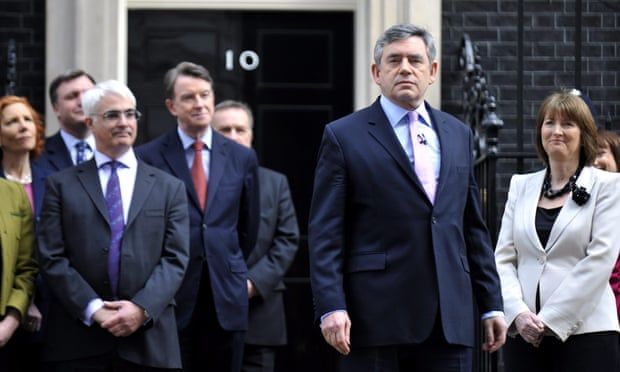 Gordon Brown addresses the media outside 10
Downing Street in April 2010. He had earlier called on the Queen to seek
the dissolution of parliament, kicking off a general election campaign.
Gordon Brown addresses the media outside 10
Downing Street in April 2010. He had earlier called on the Queen to seek
the dissolution of parliament, kicking off a general election campaign.
Publication of the cabinet manual in 2010 was a constitutional innovation of great importance. The very act of writing down rules has proved a further stage in constitutionalising the monarchy and limiting its role as head of state, so enabling the monarch to act more effectively as an impartial head of the nation.
The Queen, however, was not only queen of the United Kingdom. She also had other roles deriving from Britain’s imperial history, being queen of 15 other realms including Canada, Australia and New Zealand and various members of the New Commonwealth from the Caribbean and Oceania.
In these realms, almost all of the Queen’s functions are undertaken by a governor-general. This was of some importance when, in 1975, the governor-general of Australia, Sir John Kerr, controversially dismissed the prime minister, Gough Whitlam. Kerr rightly did not consult the palace, for the Australian constitution vests the power of dismissal in the governor-general, not the Queen. The Queen was in any case precluded from intervening, even had she wished to do so, except on advice from the prime minister of Australia.
Nevertheless, the system is open to misunderstanding. In 1994 the Queen opened the parliament of Belize in her role as the country’s queen. The Queen’s speech, delivered on the advice of her ministers in Belize, declared that law enforcement was not in itself sufficient to combat rising crime, and that the roots of crime lay in social conditions. This was the very opposite of the doctrine being preached at the time by Britain’s home secretary, Michael Howard.
With the development of strong feelings of nationhood in the overseas realms, there is likely to be increased questioning of the desirability of an absentee head of state. Australia held a referendum in 1999 on becoming a republic. The monarchy survived, but narrowly, primarily because its opponents were divided.
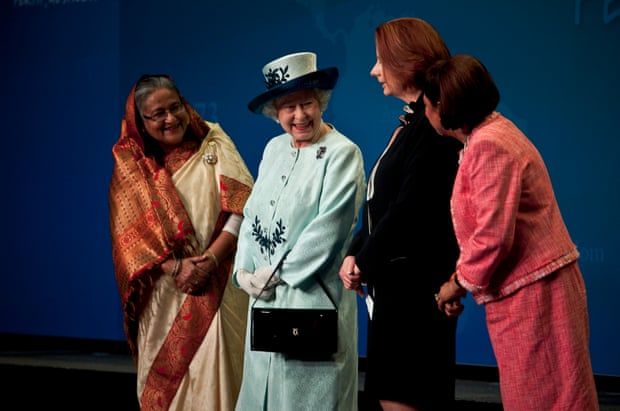 Bangladesh’s prime minister Sheikh Hasina; the
Queen; the Australian prime minister, Julia Gillard; and Trinidad and
Tobago’s prime minister, Kamla Persad-Bissessar, pose for the official
female leaders’ photograph at the Commonwealth Heads of Government
Meeting in Perth, Australia, in 2011.
Bangladesh’s prime minister Sheikh Hasina; the
Queen; the Australian prime minister, Julia Gillard; and Trinidad and
Tobago’s prime minister, Kamla Persad-Bissessar, pose for the official
female leaders’ photograph at the Commonwealth Heads of Government
Meeting in Perth, Australia, in 2011.
Of the 54 member states of the Commonwealth, 39 – including all of the Asian and African members – are republics, recognising the Queen as head of the Commonwealth. This is a purely symbolic position, since the Commonwealth is not a state and the sovereign exercises no constitutional functions.
The Queen came to maturity during the years when empire was being transformed into Commonwealth, and her declaration of service, made in South Africa in 1947, was delivered to “our great imperial family”. In her Christmas Day broadcast of 1953, she declared that to the “new conception of an equal partnership of nations and races I shall give myself heart and soul every day of my life”.
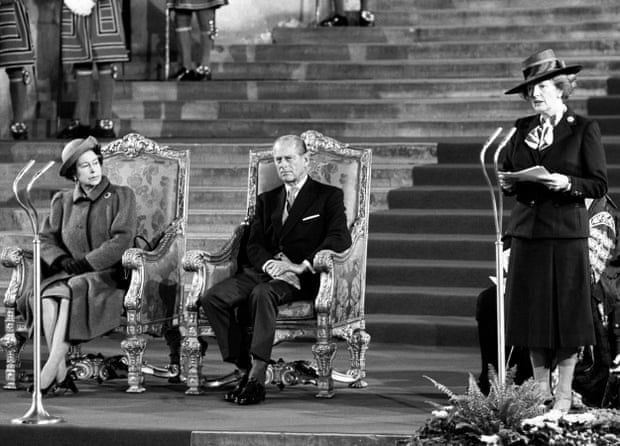 Margaret Thatcher addresses the 32nd
Commonwealth parliamentary conference in 1986, alongside the Queen and
the Duke of Edinburgh.
Margaret Thatcher addresses the 32nd
Commonwealth parliamentary conference in 1986, alongside the Queen and
the Duke of Edinburgh.
It is noticeable that republics in the Commonwealth showed her as much affection as her overseas realms. In 1986, when the press reported differences between the Queen and the then prime minister, Margaret Thatcher, these related primarily to the imposition of sanctions against South Africa, which Thatcher resisted but the rest of the Commonwealth and the Queen allegedly supported. The Sunday Times article reporting the rift was headlined “Our African Queen”. The Commonwealth connection gave the British monarchy an international perspective, which served to distinguish it from its counterparts elsewhere.
As a constitutional monarch, the Queen had no power. But this did not mean she had no influence. That influence was primarily exerted at her confidential weekly audiences with her prime ministers. She had the benefit of a far longer experience of public affairs than any of them, going back to the days of Winston Churchill, her first PM. Audiences, based on the Queen’s assiduous reading of official papers, may well have had an effect on the thinking of her prime ministers.
On occasion, and sometimes by design, the Queen’s views have become known. She has expressed her fears over the possible break-up of the UK. Speaking to parliament on her silver jubilee in 1977, when the Labour government was enacting proposals for devolution, she declared: “I cannot forget that I was crowned Queen of the United Kingdom of Great Britain and Northern Ireland. Perhaps this jubilee is a time to remind ourselves of the benefits which union has conferred at home and in our international dealings, on the inhabitants of all parts of the United Kingdom.”
In the 1980s, it was widely believed that she was distressed, not just by differences between Thatcher’s government and other Commonwealth governments on South African sanctions and attitudes towards the illegal white regime of Ian Smith in Rhodesia, now Zimbabwe, but also by Thatcher’s economic policies, which appeared to be causing distress to many communities.
Shortly before the Scottish referendum of 2014, when it was feared that Scotland might vote for independence, she told an onlooker at Crathie church, near Balmoral, that she hoped Scots would “think very carefully about the future” when they came to vote. That was a comment neutral in form but its import was clear.
In October 2021 in the run-up to the Cop26 climate talks in Glasgow, the Queen was overheard expressing irritation at governments “when they talk” about climate change but “don’t do”.
In 1872, Disraeli insisted: “The principles of the English constitution do not contemplate the absence of personal influence on the part of the sovereign; and, if they did, the principles of human nature would prevent the fulfilment of such a theory.” But the precise effect of that influence will not be gauged until her official biography appears, and perhaps not even then. What is already clear, however, is that during a period of radical change, the Queen, precisely because she was a model constitutional monarch, was able to represent the whole nation to itself more effectively than any of her predecessors.




